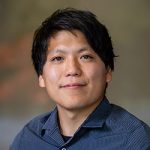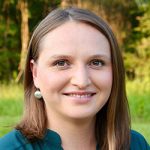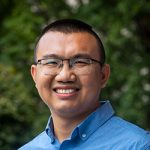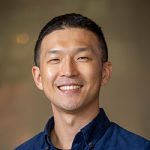
Postdoctoral Awards for Research Excellence
Each year, the Postdoctoral Awards for Research Excellence (PARE) are given in recognition of the research promise demonstrated by individual postdoctoral scholars. The awards are open to postdoctoral scholars in all disciplines. Each recipient receives a monetary award of $1,200.
2024 PARE Award Recipients
László Bálint, Department of Cell Biology & Physiology, School of Medicine

Research: In the lab of Kathleen Caron, Bálint studies the organ-specific roles of lymphatic vessels in physiological and pathophysiological processes, with a special focus on the lymphatics in the heart and central nervous system. In his most recent studies, he revealed a molecular mechanism that promotes the formation of novel lymphatic vessels upon ischemic heart injury — when the heart’s arteries restrict blood flow and oxygen to the heart — and improves survival post-cardiac injury.
Impact: Historically, lymphatic vasculature has been largely underappreciated and understudied. Bálint’s findings provide a better understanding of the roles of organ-specific lymphatic vessels in health and disease.
Katherine Barnett, Lineberger Comprehensive Cancer Center, School of Medicine

Research: In Jenny Ting’s lab, Barnett researches how viruses damage human hosts and stimulate the immune system with an emphasis on SARS-CoV-2 infection. She has led multiple, highly collaborative research projects that revealed how damage from SARS-CoV-2 infection stimulates inflammation exacerbated in severe COVID-19 cases, how the virus causes cell death in the airway, and how inflammatory responses to the strain differ between organ systems. Overall, her work revealed a critical role for cell death and damage in the immune response and identified key molecular pathways involved in COVID-19 pathogenesis.
Impact: COVID-19 can damage many organ systems and has dangerous manifestations attributed to immune dysfunction, such as life-threatening sickness and debilitating long COVID. This work is essential to understanding how viral damage processes contribute to the different manifestations of COVID-19 and pinpoint molecular targets for therapeutic intervention.
Kaneesha R. Johnson, Department of Political Science, College of Arts and Sciences

Research: A fellow within the Carolina Postdoctoral Program for Faculty Diversity, Johnson’s research lies at the intersection of public policy, the criminal legal system, and historical institutionalism within the field of American politics. Using statistical and archival research methods, her work identifies how the state punishes people through various institutions — including the criminal legal, education, housing, and welfare systems — with a focus on racial and class inequalities in punitive encounters. Her work also examines how highly punished communities build power to counteract negative interactions with the state.
Impact: This work expands the discipline’s definition of punishment beyond the criminal legal system and, in turn, provides a more complete picture of subjugated communities.
Matthew Kessinger, Department of Chemistry, College of Arts and Sciences

Research: Kessinger’s research focuses on understanding the fundamental bond-forming and bond-breaking steps involved in converting water and carbon dioxide into useful chemical fuels. One approach to achieving clean and renewable energy is to store the unused energy produced by sunlight in new chemical bonds. His work uses time-resolved absorption spectroscopy — monitoring changes in light molecule absorption as a function of time — to study the initial chemical steps involved in water oxidation. He seeks ways to direct and control these reactions for more efficient solar fuels formation.
Impact: This work will develop new techniques that will allow researchers to study complex chemical transformation at the material interfaces used in next-generation solar fuel technologies. In addition, Kessinger’s work will provide researchers and chemical engineers with the ability to design catalytic systems where the fundamental steps involved in water oxidation can be easily controlled, providing more efficient routes to achieve solar fuels formation. In doing so, this work will pave the way for new energy storage technologies and encourage the adoption of renewable fuels.
Maria White, Department of Microbiology and Immunology, School of Medicine

Research: Maria White studies viral lymphomas — blood cancers that develop in the lymph system —which are a subtype of non-Hodgkin lymphoma caused by infection with human gammaherpesviruses. These lymphomas are often aggressive and develop drug resistance. White is interested in characterizing novel treatment targets for these cancers. Her research demonstrates that inhibiting mitotic kinase (NEK2) could be a new treatment approach for viral lymphoma. Her data shows that targeting NEK2 cannot only kill viral lymphoma cells but also reduce drug resistance signatures.
Impact: This work will help contribute to novel therapeutic options for patients with viral non-Hodgkin lymphoma and further the understanding of how viral lymphomas develop, progress, and become resistant to drugs.
2023 PARE Award Recipients

Jessica Hoffman is a postdoctoral trainee in the behavior and molecular pharmacology lab of Clyde Hodge. Her work is based on the scientific premise that addiction to alcohol and other drugs is a form of maladaptive neuroplasticity. She is evaluating a novel protein as a fundamental mechanism that drives the rewarding effects of alcohol and is using molecular genetics and pharmacological strategies to evaluate therapeutic strategies that may help alleviate behavioral problems associated with addiction.
Hoffman’s publications have major significance for understanding how alcohol and drugs alter the brain to produce behavioral pathologies across the lifespan and may lead to new therapeutic approaches for treating alcohol use disorder.

Joji Tanaka is a postdoctoral researcher studying polymer chemistry and materials in the lab of Wei You. He led the creation of a new research field called Reversible-Addition Fragmentation Chain Transfer (RAFT) step-growth polymerization that will help scientists achieve previously unattainable polymeric materials with unique chemical composition and architectures.
Tanaka has helped You’s lab make unique discoveries in other novel polymerization methodologies, such as orthogonal polymerization platforms. His collective works have clear implications for technological development and impact on industry and biotechnology.

Aleksandra Skrajna is an American Cancer Society Postdoctoral Fellow in Robert McGinty’s lab. Her research focuses on understanding universal principles that govern interactions with the nucleosome, the repeating unit of chromatin, which stores the genetic information of cells. She identified nucleosome binding hot-spots and described amino acid resolution nucleosome footprints for hundreds of proteins representing diverse nuclear functions. Her work has settled long-standing debates in her field and opened new avenues of epigenetic research.
In addition to conducting research, Skrajna has been active in the postdoc community at Carolina, leading a series of monthly meetings and serving on the first postdoc advisory Committee at Eshelman. She will transition to an assistant professor position in the Department of Chemistry and Biochemistry at the University of California Santa Cruz in January 2024.

Ying Zhou is a postdoctoral research associate in the lab of Jinsong Huang. He conducts research with the goal of developing perovskite photodetectors to replace commercial silicon photomultipliers (SiPMs) for photon counting . This promising research area can bring a revolutionary cost-effective approach to count photons and the success of this approach will benefit science and everyday applications including medical imaging, unmanned automatic driving, cameras, and more.
Zhou is the first author on more than 10 publications in prestigious journals like Nature, Nature Photonics, and Science Advances. In addition to his research, Zhou participates in interdisciplinary activities like seminars and recruiting events and actively works with graduate students to develop their skills and knowledge.

Woosuk Steve Hur is a postdoctoral fellow in the lab of Matthew Flick in the UNC Blood Research Center. He focuses on uncovering the molecular and cellular mechanisms that link the development of thrombosis, obesity, and associated metabolic pathologies. Hur co-led research that demonstrated how selectively reducing circulating fibrinogen levels is protective against occlusive venous thrombosis while preserving significant hemostatic potential. The results have paved the way for better understanding novel mechanisms of hypofibrinogenemia as well as investigating the potential translational benefits of lowering circulating fibrinogen as an antithrombotic therapy.
Hur is currently investigating the role of fibrinolytic proteins in experimental obesity and metabolic abnormalities and is in the process of developing independent projects. He will combine his training in basic mechanisms in hemostasis, fibrinolysis and thrombosis with the pathogenesis of obesity and metabolic syndrome to investigate the impact of hypofibrinolysis in obesity-driventhrombosis and other metabolic pathologies, particularly nonalcoholic fatty liver disease, for which there are no FDA-approved drugs.
Past Recipients
2022
- Aobo Li, Physics and Astronomy
- Sophie Maiocchi, Cell Biology and Physiology, Center for Nanotechnology in Drug Delivery
- Laura Ornelas, Bowles Center for Alcohol Studies
- Nipun Saini, Nutrition Research Institute
- Wei Shi, Integrative Program for Biological and Genome Sciences
2021
- Li Ke, School of Education
- Rebecca Krupenevich, Joint Department of Biomedical Engineering
- Zhenyi Ni, Applied Physical Sciences
- Kai Wang, Department of Ophthalmology
- Jessica C. Young, Sheps Center for Health Services Research
2020
- Kathryn Gunn, Biochemistry and Biophysics
- Kerrel Murray, School of Law
- Liujiang Song, Gene Therapy Center & Ophthalmology
- Deshira Wallace, Health Behavior
- Margeaux Wetendorf, Cell Biology and Physiology
2019
- Karen Boschen, Bowles Center for Alcohol Studies
- Tao Che, Pharmacology
- Lauren Hill, Sheps Center for Health Services Research
- Chantel Martin, Epidemiology
- Yu Mi, Pharmacy
- Lisa Spees, LCCC
- Aaron Teator, Chemistry
- Yanyan Yang, Biochemistry and Biophysics
- Xiao Yang, Geological Sciences
- Yue Zhang, Environmental Sciences & Engineering
2018
- Hongwei Du, LCCC
- Kathryn Harper, Bowles Center for Alcohol Studies
- Laura Raffield, Genetics
- Wentao Li, Biochemistry and Biophysics
- Michael Sidorov, Cell Biology and Physiology
- Cassandra Spracklen, Genetics
- Marie Stoner, Carolina Population Center
- Ludovic Troian-Gautier, Chemistry
- Song Zhang, LCCC
- Yang Zhou, Pathology and Laboratory Medicine
2017
- Lauren Gaydosh, Sociology
- Zhe Ma, LCCC
- Rajendra Mitra, Ophthalmogoly
- Ciara O’Flanagan, Nutrition
- Renato Sampaio, UNC Energy Frontier Research Center
2016
- Aadra Bhatt, Chemistry
- Sarah Davies, Marine Sciences
- Dan Dickenson, Biology
- Tory Eiselohr-Moul, Psychiatry
- Lori Hoggard, Center for Health Equity Research
- Gabriel Lazaro, Center for Genomics and Society
- Catherine Marcinkiewcz, Bowles Center for Alcohol Studies
- Saray Shai, Mathematics
- Aussie Suzuki, Biology
- Amanda Van Swearingen, LCCC
2015
- Kemi Doll, Obstetrics and Gynecology
- Byron Farnum, Chemistry
- Adam Gracz, Gastroenterology and Hematology
- Jinchuan Hu, Biochemistry and Biophysics
- Amy Johnson, Nutrition
- Lavar Munroe, Art
- Anya Prince, Social Medicine
- Jeremy Rotty, Lineberger Comprehensive Cancer Center
- Dane Taylor, Mathematics
- Jason Yi, Pharmacology
2014
- Yosuf Aachoui, Department of Microbiology and Immunology
- Yacine Boulaftali, McAllister Heart Institute
- Marci Cottingham, Department of Social Medicine
- Shannon Crowley, Department of Psychiatry
- Anne Justice, Department of Epidemiology
- Peng Kang, Department of Chemistry
- Anthony Lau, Department of Biomedical Engineering
- Vineet Menachery, Department of Epidemiology
- Mika Mustonen, Department of Physics and Astronomy
- William Sturkey, Department of History
2013
- J. Mauro Calabrese, Department of Genetics
- Shobhan Gaddameedhi, Department of Biochemistry and Biophysics
- Matteo Giletta, Department of Psychology
- Jennifer Kane, Carolina Population Center
- Portia Kunz McCoy, Department of Cell and Molecular Physiology
- Jennifer Prairie, Departments of Mathematics and Marine Sciences
- Scott Rothbart, Lineberger Comprehensive Cancer Center
- Sara Trace, Department of Psychiatry/Eating Disorders Program
- Daisuke Urano, Department of Biology
- Aaron Vannucci, Department of Chemistry
2012
- Sandra Albrecht, Carolina Population Center
- Jessica Baker, Department of Psychiatry/Eating Disorders Program
- Vivian Gama, Department of Neuroscience Center
- Hsien-Sung Huang, Department of Cell and Molecular Physiology
- Mosi Ifatunji, Department of Sociology/Carolina Population Center (Carolina Postdoc for Faculty Diversity)
- Kathryn Muessig, School of Medicine, Division of Infectious Disease
- Tadashi Nakagawa, Lineberger Comprehensive Cancer Center
- Dileep Varma, Department of Biology
- Haitao Wen, Lineberger Comprehensive Cancer Center
- Jason Wolff, Carolina Institute for Developmental Disabilities
2011
- Karla Ausderau, Allied Health Sciences
- Silvia Bezer, Department of Chemistry
- Karl D. Castillo, Department of Marine Sciences
- Zuofeng Chen, Department of Chemistry
- Tae-Yeon Eom, Neuroscience Center
- Nuri Ozturk, Department of Biochemistry and Biophysics
- Kimberly Powers, Departments of Epidemiology and Medicine
- Laura Widman, HIV/STD Infectious Disease Center
- Nathalie Williams, Carolina Population Center
- Pengcheng Xun, Department of Nutrition
2010
- Cendra Agulhon, Department of Pharmacology
- Christy Avery, Department of Epidemiology
- Janne Boone-Heinonen, Interdisciplinary Obesity Training/Carolina Population Center
- Jacquelyn Bower, Lineberger Comprehensive Cancer Center
- Charles Davis, Department of Art History (Carolina Postdoc for Faculty Diversity)
- Jun Li, Molecular Pharmaceutics, School of Pharmacy
- Paul Reiter, Lineberger Comprehensive Cancer Center
- Courtney Thaxton, Department of Cell & Molecular Physiology
- Yang Wang, Department of Pharmacology
- Angela Wendel, Department of Nutrition
2009
- Irving Coy Allen, Lineberger Comprehensive Cancer Center
- Sergio Chavez, Carolina Population Center
- Joyee Ghosh, Department of Biostatistics
- Tae-Hong Kang, Department of Biochemistry and Biophysics
- Conggang Li, Department of Chemistry
- Liqing Ma, Department of Chemistry
- Aaron Neumann, Department of Cell and Developmental Biology
- Nasser Rusan, Biology Department
- Mindy Steiniger, Department of Biochemistry and Biophysics
- Kai Ziervogel, Department of Marine Sciences
2008
- Guohua Cao, Department of Physics and Astronomy
- Javier Concepcion, Department of Chemistry
- Molly De Marco, Sheps Center for Health Services Research
- Paul Hoertz, Department of Chemistry
- Xiaoyang Hua, Pulmonary Division of the Department of Medicine & Center for Environmental Medicine, Asthma and Lung Biology
- Ajit Joglekar, Department of Biology
- Alexey Savelyev, Department of Chemistry
- Naomi Spence, Carolina Population Center
- Jill Weimer, Neuroscience Research Center
- Shuangye Yin, Department of Biochemistry
2007
- James Patrick Cronin, Department of Biological Sciences
- Mathew Dupre, Carolina Population Center
- Matthew Frieman, Hooker Research Center, School of Public Health
- Hegui Gong, Department of Chemistry
- Laura Halperin, Department of English and Comparative Literature
- Heidi M. Mansour, Division of Molecular Pharmaceutics, School of Pharmacy
- Dan Marston, Department of Biology
- Joanna Poblete-Cross, Department of History
- Rachael Rigby, Department of Cell and Molecular Physiology
- Leslie Sombers, Department of Chemistry
2006
- Zhongying Chen, Department of Biology
- Shannon Davis, Carolina Population Center
- Nora Franceschini, Department of Epidemiology
- Andrea (Nackley) Neely, School of Dentistry’s Center for Neurosensory Disorders
- Thomas Parsons, Department of Neurology
- David Singleton, Department of ESE
- Anthony Yannarell, Institute of Marine Sciences
2005
- Melanie Bishop, Institue of Marine Sciences
- Jennifer DeLuca, Department of Biology
- Feng Ding, Department of Biochemistry & Biophysics
- Jay Garcia, Carolina Postdoc for Faculty Diversity
- Steven Hitlin, Carolina Population Center
- Karen Kim, Department of Health Behavior & Health Education
- Craig Lee, Pharmacotherapy and Experimental Therapeutics
- Kristopher Preacher, Department of Psychology
- Eric Wagner, Department of Biochemistry & Biophysics
2004
- J. Scott Brown, Carolina Population Center
- David Carr, Carolina Population Center
- Daniela Cimini, Department of Biology
- Raymond Coakley, Cystic Fibrosis/Pulmonary Research and Treatment Center
- Timothy Donaldson, Lineberger Comprehensive Cancer Center
- Heidi Gazelle, Center for Developmental Science
- Aiguo Hu, Department of Chemistry
- Robert Maile, Department of Microbiology and Immunology
- Hengbin Wang, Lineberger Comprehensive Cancer Center
- Francis Willard, Department of Pharmacology